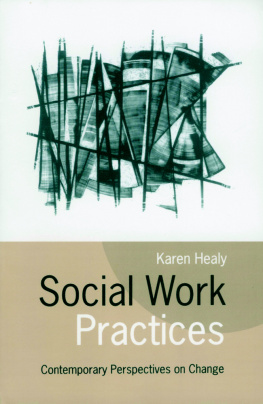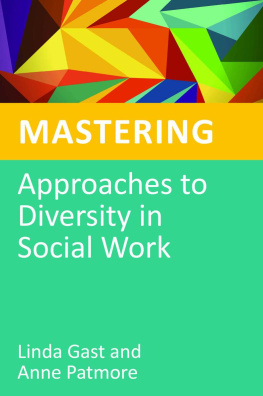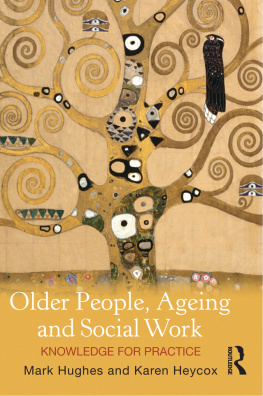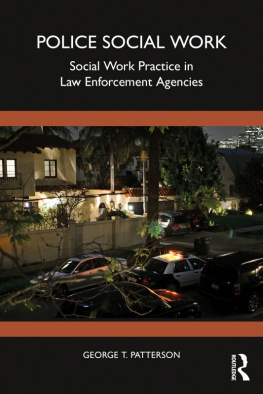ISBN 0-7619-6271-9 (hbk)
ISBN 0-7619-6272-7 (pbk)
Karen Healy, 2000
First published 2000
Apart from any fair dealing for the purposes of research or private study, or criticism or review, as permitted under the Copyright, Designs and Patents Act, 1988, this publication may be reproduced, stored or transmitted in any form, or by any means, only with the prior permission in writing of the publishers, or in the case of reprographic reproduction, in accordance with the terms of licences issued by the Copyright Licensing Agency. Inquiries concerning reproduction outside those terms should be sent to the publishers.
| SAGE Publications Ltd 1 Olivers Yard, 55 City Road London EC1Y 1SP SAGE Publications Inc 2455 Teller Road Thousand Oaks, California 91320 SAGE Publications India Pvt Ltd B42 Panchsheel Enclave PO Box 4109 New Delhi 110 017 |
British Library Cataloguing in Publication data
A catalogue record for this book is available from the British Library
Printed digitally and bound in Great Britain by
Lightning Source UK Ltd., Milton Keynes, Bedfordshire
Acknowledgements
I am grateful for the generous support and encouragement I have received from many people over the course of this work. My special thanks go to Ingrid Burkett, Graham Floater, Sue Goodwin, Mai McCouat, Joan Mulholland and my colleagues at the University of Sydney. I thank Professor Jan Fook, Professor Peter Leonard and Dr Colin Peile for their rare gifts of intellectual generosity and leadership. I am deeply grateful for their openness to differences, whole-hearted support of this project and for their ongoing affirmation of the importance of critical social work practices. Thanks to Karyn Walsh for friendship, mentoring and intellectual challenges, and to the young women who participated in the antiviolence project for giving so much in their insights about social work practices. I wish to acknowledge Queensland Health, who provided the original funding for the young womens anti-violence project and thus provided me with a fabulous opportunity to study activist practices in detail.
Thanks to Karen Phillips, editor at Sage, for her encouragement of this work and for carrying on our e-mail conversation across the world! Finally, my heartfelt thanks to Julie Conway, Rachael Healy and Dennis Longstaff for their love and friendship, which meant that, even when I was going out on a limb, I never felt really alone.
This is my original work. I do draw, in small part, on two previously published papers. I thank the editors of the journals mentioned for permission to reproduce aspects of these papers:
| K. | Healy, (1998) Participation and child protection: the importance of context, The British Journal of Social Work, 28 (6): 897-914. |
| K. | Healy and J. Mulholland (1998) Discourse analysis and activist social work: investigating practice processes, Journal of Sociology and Social Welfare, 25 (3): 3-27. |
1 Social Work: Contemporary Challenges
Throughout the history of modern social work activists have sought to articulate the radical potential of social work. Through their critical interrogations these thinkers have contributed to the evolution and, in some instances, the subversion of social work. Very often, however, social workers experience difficulty in translating an activist commitment to practice, and the gulf between theory and practice has grown wider despite a claim to praxis in much of the contemporary social work literature. Rather than something that helps social workers understand and develop practice, theory is often experienced as, at worst, authoritarian or esoteric and, at best, an addition to practice rather than something useful to it. The venture I am embarked on in this book is to demonstrate the opportunities recent theoretical developments provide for different ways of thinking about and doing progressive social work. I will use the opportunities these contemporary theories provide for destabilizing the oppositions that have become part of the modern social work landscape, and in so doing my intention is to assist social workers think through the challenges of practising critically in the contemporary contexts of transition.
The focus of this book is an important one at this point in the history of critical social work. As we enter a new millennium, it is timely for critical social workers to reflect on the legacy bestowed via the theoretical and practice impulses that have nurtured the emergence of activist practice approaches in the latter half of the twentieth century. It is also an opportunity to take stock of the momentous contests that now beset social workers committed to progressive social change.
The contemporary climate: post-Fordist abyss or grounds for hope?
The dramatic socio-economic transformations that have occurred internationally over the past two decades provide a very different landscape for social work than when critical practice theories first came to prominence in the 1960s. Massive social and economic upheaval attendant with globalization and the large-scale withdrawal of the welfare state mean that all certainty about basic social service provision is gone and the possibilities for a progressive reorganization of welfare services seem bleak. Indeed activists who have long critiqued state welfare now look on nervously at the dismantling and restructuring of a minimalist welfare state. The language of managerialism, which first entered welfare discourse in the 1970s, has achieved ascendancy (L. Davies, 1990). As terminology such as lean production, re-engineering, purchaser/provider splits, inputs and outputs is now common parlance in the organization of social services, it is perhaps not an exaggeration to claim that the McWelfare state has arrived! The role of social workers is stripped of complexity as their functions are reduced to a bare minimum and to the management of service users cases. As Parton (1994b) writing from within the British context observes: social workers reconstituted as care-managers, are required to act as co-ordinators of care packages for individuals (p. 99).
Despite resistance to postmodern perspectives amongst many critical social workers, it is increasingly difficult to ignore the challenges levelled through them. Postmodern insights draw activists inexorably towards a recognition of the oppressive effects of the utopian ideals that have guided us. Bauman (1992) asserts that We, the residents of the postmodern habitat, live in a territory that admits no clear options and strategies that can even be imagined to be uncontroversially correct (p. 185). Postmodernists reject visions of massive social transition as a chimera and demand, instead, greater caution and constraint in the formation of critical practice objectives and processes.
It is easy to be pessimistic as the certainties that once guided activism provide little succour in the face of the challenges before us. Yet, I contend there are some, highly limited, grounds for optimism. As the truth claims and grand plans of critical social work give way under the force of political and theoretical challenges, new directions are emerging. Some of these are admittedly bleak as we stare into the abyss of a post-Fordist welfare state where the social work role is reduced to piecemeal, patch-up work with no hope of a better tomorrow. At the same time, however, the contests posed at the turn of this century can draw activists to a new pragmatism focused on local, contextual and modest proposals for change activity. Despite the activist critique of the esoteric nature and language of poststructuralism, critical elements of this school can invite the re-examination of the practical problems confronting social workers and services users in relation to local issues of power, identity and processes of change, and it is to the exploration of these possibilities that this book is committed.












